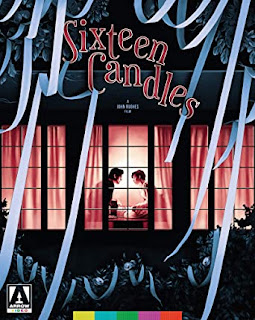The film is odd right from its
opening, when a hand, missing its thumb, opens a locker and puts a
creepy-looking little sculpture inside, which then begins to glow. After that,
we are introduced to Scott (Mitch Gaylord), a young, handsome rickshaw driver,
who gives a ride to an elderly Asian woman in the rain. This is done in slow
motion, and is set to some pretty music, giving the scene a magical quality.
And of course there is some sort of magic at work; only, we are not aware of that
as yet. Months later, Scott receives in the mail a gift from the old woman,
though he drops the accompanying letter down the stairwell and doesn’t bother
to retrieve it. Could there be some important information in that letter? The
gift itself is strange, a green talisman, and if I received something like
that, I would want to read the letter to get the explanation. But Scott has
other troubles, including a high phone bill because of his roommate, Daniel,
and so puts the talisman in a drawer and forgets about it.
After a stripper chooses him
from all the other rickshaw drivers (most likely because he’s straight – there are a few gay characters in this film, which is refreshing) and then coaxes him
onto a boat with the promise of sex, he finds himself in a fight with Reverend
Mortom’s son, who was secretly videotaping the action from behind a mirror.
During the tussle, an important key ends up in the water. Scott manages to beat
the guy up, but ends up grabbing the wrong videotape. When later that night he
returns to retrieve it, he finds that the guy has been murdered. Soon the
actual killer is hunting Scott down, believing him to have the key. And of course
the police are after him as well. Things soon spiral out of control for Scott,
and the only person he can turn to for help is the stripper, Joanna Simpson
(Victoria Prouty).
Reverend Mortom (Donald
Pleasence) is one of those fire and brimstone types. He
tells his followers, “You have made me
rich and powerful so that I can show you the glory of God.” Well, the first
part of that sentence is accurate, I suppose. But this man clearly has no
interest in the glory of God. What he is interested in is retrieving that evil
sculpture.
The movie is filled with
interesting and unusual moments. And we are reminded that it is the late 1980s
when Scott threatens to stab the stripper with a dirty needle, telling her: “I found it in the gutter. I’m sure you’re familiar
with AIDS.” Later he asks her, “Can I
trust you?” And she replies, “Tie me
to the bed.” By the way, when the cops try to get Joanna to proofread her
formal statement, and she doesn’t bother, saying “I’m sure it’s just fine,” well, it is not fine. If you look at the
statement, you’ll see that her name is wrong. It reads, “Joanna Kimpson.” Also,
the world “police” is misspelled. Fortunately, the cops won’t need that
statement in court. It’s strange, because on the one hand, this film doesn’t
seem to pay attention to details like that, but on the other, it does give us a
lot of information with just a line or two, or even the hint of a line,
providing important details without hitting us over the head with them. There
is very little obnoxious exposition, which makes the movie more believable. American Rickshaw is an action film, a
thriller, a horror film, and even a love story. It is more than a bit goofy at
times, but totally enjoyable, and it features a pretty fantastic ending.
Special Features
The Blu-ray contains several
special features. There is a commentary track by Kat Ellinger (author of All The Colours Of Sergio Martino) and
film critic Samm Deighan. Kat mentions that American
Rickshaw is one of the films that inspired her to write her book on Sergio
Martino. They talk about the director’s work, and about the myriad ways in
which this film is unusual. There are also interviews with director Sergio
Martino and production designer Massimo Antonello Geleng. Sergio Martino talks
about Italian cinema, and how it managed to often be much less expensive than
American productions. He also talks about shooting in Miami, and tells a funny
anecdote about a change he had to make while shooting a certain scene. Massimo
Antonello Geleng talks about his varied career and reveals he’s never seen the
film American Rickshaw. Both
interviews are conducted in Italian, with English subtitles, and total
approximately eighteen and a half minutes.
The special features also
include an episode of the podcast The
Production Booth, hosted by Mike White, with guests Kat Ellinger and Cullen
Gallagher. All three clearly love the film, but talk about some of its
troubles, including that the quote at the beginning is falsely attributed to
Confucius, and that 1966 is not the Year of the Tiger, a somewhat important
plot point in the movie. They also talk about the voyeurism of the film. This
feature is audio only, and is approximately sixty-five minutes.
Location: Miami Now And Then is a short piece on the locations, the
“now” being 2019 and the “then” being footage from the film itself. This
footage is set to instrumental music. There is no narration. It is
approximately three minutes. There is also a photo gallery, which plays on its
own, so there is no need to hit the arrow button. It features poster art and
production stills.
American Rickshaw was directed by Sergio Martino, and was released
on Blu-ray on June 23, 2020 through Cauldron Films.







